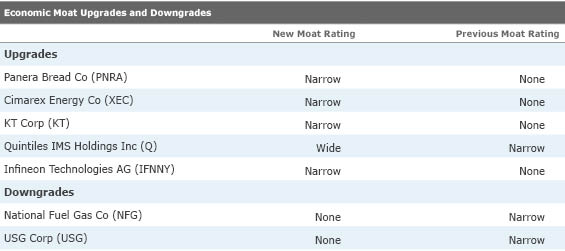3 Cheap Stocks With Shifting Moats
We've adjusted our take on the competitive advantages of these undervalued firms.
What gives certain companies an edge over their peers, while others struggle to maintain profitability? This question is at the heart of our equity analysis at Morningstar.
Morningstar equity analysts believe that these five attributes imbue companies with economic moats, or structural advantages that protect their profits from competition and allow them to earn high returns on capital for many years. By assigning a Morningstar Economic Moat Rating to companies, we attempt to quantify the size or sustainability of an advantage. A company with competitive advantages that we expect to last more than 20 years has a wide moat; one that can fend off its rivals for 10 years has a narrow moat; while a firm with either no advantage or one that we think will quickly dissipate has no moat.
Our moat methodology considers both quantitative and qualitative factors. This article explains some of the factors we use to determine how sustainable a company's future economic profits will be. They include analyzing the company's financial statements, talking to its managers, visiting the firm's operations when relevant, and reading industry publications.
But this fundamental analysis is not a one-and-done affair. Sometimes our continued research and due diligence leads us to upgrade or downgrade a company's moat rating if we see evidence that the company's competitive advantage is either strengthening or eroding.
The following is a roundup of changes in moat ratings that analysts have made over the past couple of months, including a deeper dive into three that are currently trading in 4-star range.

Panera Bread Co
PNRA
Economic Moat: Narrow Fair Value Uncertainty: Medium Price/Fair Value: 0.76
Morningstar analyst R. J. Hottovy believes that Panera is one of the few restaurant operators that possesses a competitive advantage. "Nonexistent customer switching costs, intense industry competition, and low barriers to entry" make it inherently challenging for restaurant operators to establish an economic moat, Hottovy says. However, he believes Panera has developed a narrow moat owing to its strong brand, upscale and convenient restaurant environments, and continuously evolving menu. In addition, Hottovy has been impressed with Panera's "2.0" initiatives, which use technology to enhance the customer experience and streamline restaurant operations--one example of which is Panera's mobile ordering and payment capabilities. Hottovy also notes that Panera is one of only few restaurant operators with a brand strong enough to allow it to meaningfully expand its delivery and catering business, as well as its Panera at Home packaged goods business--both of which Hottovy sees as potential growth areas.
Quintiles IMS Holdings Inc
Q
Economic Moat: Wide Fair Value Uncertainty: Medium Price/Fair Value: 0.84
The merger of Quintiles, a provider of late-stage contract research, and IMS Health, the dominant player in healthcare data and analytics, has resulted in a behemoth contract research organization. (A CRO provides research support to the pharmaceutical, biotechnology, and medical device industries on a contract basis, often for clinical studies and clinical trials.) The company's proprietary data sets, technology, expertise, and reputation give it an advantage over its competitors. In fact, it is the "go-to partner" for drug development and commercialization services, says Morningstar equity analyst Kelsey Tsai. She believes the company benefits from strategic, long-term relationships with biopharma partners and has increasingly entrenched itself in their processes, creating high customer switching costs. Also, the "capital-light" nature of QuintilesIMS' business allows it to quickly scale its products and expand its clientele with very low marginal costs, leading to high returns on invested capital, Tsai said.
USG Corp
USG
Economic Moat: None Fair Value Uncertainty: High Price/Fair Value: 0.69
USG has a lot of things going for it. Its Sheetrock brand is the most recognized wallboard brand in the U.S. In addition to this well-respected brand, USG benefits from strong research and development capabilities, a broad sales and distribution footprint, and exclusive ceiling distribution agreements, writes Morningstar equity analyst Brian Bernard. These assets have created durable customer relationships and have led to USG's longstanding market share leadership position and pricing power. We also think USG's extensive network of centrally located wallboard manufacturing plants and gypsum rock mines and quarries represents a cost advantage over potential entrants.
However, we have re-evaluated whether these advantages warrant assigning the firm an economic moat; in our estimation, USG is too vulnerable to competitive threats that could challenge its leadership in the coming years. Bernard believes its possible that competitors could match product performance and take market share and pricing power away from USG. Further, he believes USG's profitability and ROICs are vulnerable to wallboard pricing volatility arising from supply and demand imbalances. Although the wallboard industry has become more rational, in Bernard's opinion, he thinks it's possible for changes in industry pricing practices and manufacturing capacity to negatively affect USG's and the industry's profitability and returns potential. *Price/fair value data as of Nov. 8, 2016.

/s3.amazonaws.com/arc-authors/morningstar/3a6abec7-a233-42a7-bcb0-b2efd54d751d.jpg)
/cloudfront-us-east-1.images.arcpublishing.com/morningstar/2UWGQD7LCJCYNF3WQ5HHLP7UBE.jpg)
/cloudfront-us-east-1.images.arcpublishing.com/morningstar/WC6XJYN7KNGWJIOWVJWDVLDZPY.png)
/cloudfront-us-east-1.images.arcpublishing.com/morningstar/HHSXAQ5U2RBI5FNOQTRU44ENHM.jpg)
:quality(80)/s3.amazonaws.com/arc-authors/morningstar/3a6abec7-a233-42a7-bcb0-b2efd54d751d.jpg)